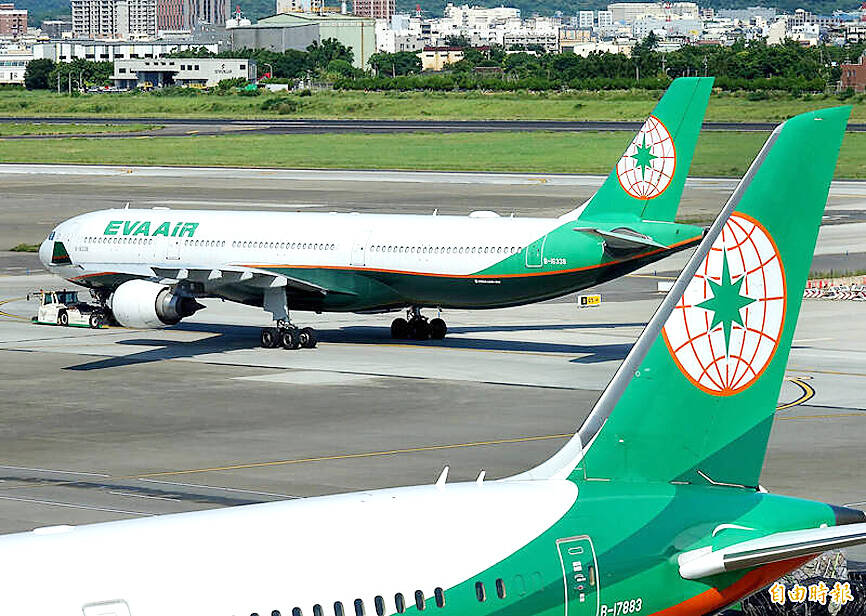EVA Airways Corp (長榮航空) has placed a firm order to purchase nine planes from Airbus SE, including six long-range A350-1000s and three single-aisle A321neo aircraft.
The order would bring EVA Airways’ backlog of aircraft to be delivered to 24 A350-1000s and 18 A321neo aircraft, Airbus said in a statement on Monday.
“The new additions to our fleet reaffirm our commitment to sustainable aviation and delivering an exceptional travel experience,” EVA Airways president Clay Sun (孫嘉明) said in the statement.

Photo: Taipei Times file photo
“Both the A350-1000 and A321neo set a high standard in their respective categories, offering remarkable efficiency and comfort to our passengers,” Sun said. “As we move forward with our fleet and network expansion plans, we look forward to leveraging the aircraft’s extended range and efficiency to strengthen our market position.”
The carrier’s board of directors on March 12 approved the plan to buy the nine Airbus aircraft for up to US$3.1 billion.
EVA Airways expects the delivery of the six A350-1000s to start in 2031 and the three A321neos in 2032.
The carrier, which operates a fleet of 85 planes, has eight Boeing Co 787-9s and five Boeing 787-10s on order, with delivery expected to be completed by 2029, while the delivery of 18 A350-1000s and 15 A321neos already on order would begin in 2027 and 2029 respectively.
EVA Airways posted a record net profit of NT$30.4 billion (US$921.02 million) for last year, up 31.6 percent from a year earlier, with earnings per share of NT$5.37, compared with NT$4.01 the previous year.
The number of passengers the carrier served hit 13.16 million last year, up 16.8 percent from a year earlier, with the average load factor — an industry metric for measuring the percentage of passenger capacity used — hitting 82.6 percent, company data showed.

NO BREAKTHROUGH? More substantial ‘deliverables,’ such as tariff reductions, would likely be saved for a meeting between Trump and Xi later this year, a trade expert said China launched two probes targeting the US semiconductor sector on Saturday ahead of talks between the two nations in Spain this week on trade, national security and the ownership of social media platform TikTok. China’s Ministry of Commerce announced an anti-dumping investigation into certain analog integrated circuits (ICs) imported from the US. The investigation is to target some commodity interface ICs and gate driver ICs, which are commonly made by US companies such as Texas Instruments Inc and ON Semiconductor Corp. The ministry also announced an anti-discrimination probe into US measures against China’s chip sector. US measures such as export curbs and tariffs

The US on Friday penalized two Chinese firms that acquired US chipmaking equipment for China’s top chipmaker, Semiconductor Manufacturing International Corp (SMIC, 中芯國際), including them among 32 entities that were added to the US Department of Commerce’s restricted trade list, a US government posting showed. Twenty-three of the 32 are in China. GMC Semiconductor Technology (Wuxi) Co (吉姆西半導體科技) and Jicun Semiconductor Technology (Shanghai) Co (吉存半導體科技) were placed on the list, formally known as the Entity List, for acquiring equipment for SMIC Northern Integrated Circuit Manufacturing (Beijing) Corp (中芯北方積體電路) and Semiconductor Manufacturing International (Beijing) Corp (中芯北京), the US Federal Register posting said. The

India’s ban of online money-based games could drive addicts to unregulated apps and offshore platforms that pose new financial and social risks, fantasy-sports gaming experts say. Indian Prime Minister Narendra Modi’s government banned real-money online games late last month, citing financial losses and addiction, leading to a shutdown of many apps offering paid fantasy cricket, rummy and poker games. “Many will move to offshore platforms, because of the addictive nature — they will find alternate means to get that dopamine hit,” said Viren Hemrajani, a Mumbai-based fantasy cricket analyst. “It [also] leads to fraud and scams, because everything is now

MORTGAGE WORRIES: About 34% of respondents to a survey said they would approach multiple lenders to pay for a home, while 29.2% said they would ask family for help New housing projects in Taiwan’s six special municipalities, as well as Hsinchu city and county, are projected to total NT$710.65 billion (US$23.61 billion) in the upcoming fall sales season, a record 30 percent decrease from a year earlier, as tighter mortgage rules prompt developers to pull back, property listing platform 591.com (591新建案) said yesterday. The number of projects has also fallen to 312, a more than 20 percent decrease year-on-year, underscoring weakening sentiment and momentum amid lingering policy and financing headwinds. New Taipei City and Taoyuan bucked the downturn in project value, while Taipei, Hsinchu city and county, Taichung, Tainan and Kaohsiung